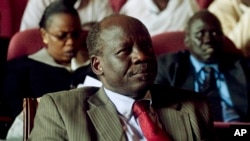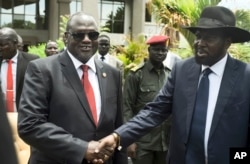A top opposition figure has quit South Sudan's unity government and declared the death of the peace deal aimed at ending the country's civil war.
Lam Akol said in a statement Monday that President Salva Kiir has repeatedly violated last year's peace agreement and dealt it a "final blow" with his actions since the first week in July, when fighting between government and opposition forces in the capital, Juba, killed at least 300 people.
In an interview with VOA's South Sudan in Focus program, Akol blamed Kiir forces for provoking the clashes, adding that without security for opposition leaders, there can be no peace deal.
"I went into the cabinet to implement the peace agreement," he said. "If the peace agreement has died, I have no moral justification to continue in that government."
There was no immediate comment from President Kiir, and it was not clear if other opposition leaders agreed with Akol that the peace deal is dead.
Akol also cited Kiir's removal of opposition chief Riek Machar as the country's first vice president. Machar has been in hiding since the clashes in Juba, citing safety concerns.
"If you don't have the first vice president, then who is your next partner in the peace agreement?" said Akol.
New Opposition Movement?
In his statement, Akol said opponents of President Kiir should "organize outside Juba." When asked by VOA if that means he is planning a new rebellion, Akol demurred, saying he wants to hold consultations.
South Sudan's Transitional Government of National Unity was formed in April, nine months after Kiir and Machar signed the peace deal under heavy international pressure in Addis Ababa.
Akol, 66, was minister of agriculture and a member of the commission that monitored implementation of the agreement. He said he is resigning both of those positions and his role as chairman of the Democratic Change Party and the National Alliance of opposition groups.
South Sudan has known conflict for more than half of its five-year history as an independent nation.
The war began in December 2013, a few months after Kiir fired Machar as his deputy. In many places, the fighting degenerated into ethnic violence pitting Kiir's Dinka tribe against Machar's Nuer tribe.
Tens of thousands have died, and more than two million South Sudanese have been driven from their homes.
The South Sudanese government and opposition have blamed each other for starting last month's renewed violence in Juba. Akol said Monday that he has evidence the violence was planned in advance but said "it will not be useful to discuss it publicly."
John Tanza of VOA's South Sudan in Focus program contributed to this report.





